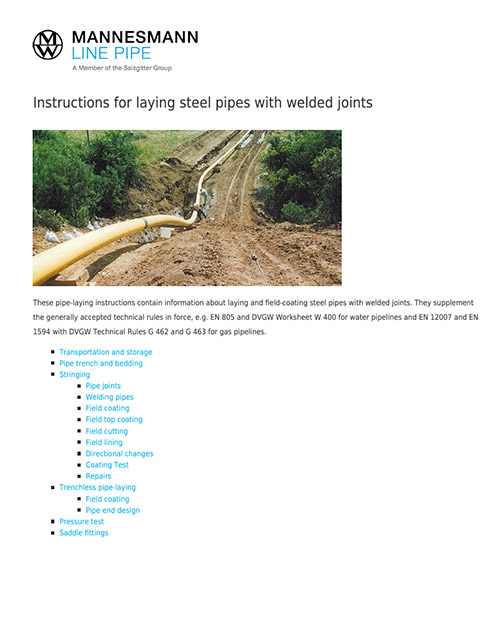Directional changes
The following options for directional changes can be taken when laying the pipes:
1 Utilization of the permissible elastic deformation in the pipeline
As regards bending radii, two application cases can be distinguished:
- On-site handling
- Bending radii in a lowered pipe string (in situ)
During handling on the construction site, the only load to be considered is the bending load. Under operating conditions, the pipe string is subject to a combined load of internal pressure and bending.
On-site handling
The formula below applies to on-site handling of both gas line pipe and cement mortar-lined water pipe:
Rmin (m) = 105 x Da x S/Rp
For a material with a yield strength of 235 N/mm² and a safety factor of 1.1 (see below), the rule of thumb for the bending radius (in m) is 500 x Da..
Bending radii in a lowered pipe string
DVGW Worksheets G 642 and G 463 contain the principles for calculating the permissible elastic bending radii for gas line pipe along the pipeline route.
Provided the calculated permissible elastic bending radii are not exceeded, the maximum design pressure (MDP)*) of the pipe is maintained. This applies in principle also to water pipelines.
| Water pipelines/ Gas pipelines with MOP < 16 bar | Gas pipelines with MOP > 16 bar |
| Rmin = 210 x Da x S/Rp | Rmin = 206 x Da x S/RP |
Rmin –min. bending radius in m
Rp – yield strength of pipe material in N/mm²
Da – pipe outside diameter in mm
S - safety factor
MOP - max. operating pressure
*) Since in most cases regarding gas and water, the operating pressure does not fully utilize the max. permissible design pressure, it may be advantageous to conduct a more accurate calculation that takes account of the actual service conditions, resulting in smaller bending radii.
The safety coefficients and yield strengths to be selected vary according to the pipe material used.
Je nach eingesetztem Rohrwerkstoff sind die Sicherheitsbeiwerte und die Streckgrenzen unterschiedlich zu wählen:
| Gas line pipe with MDP < 16 bar | Gas line pipe with MDP > 16 bar | Water pipe line | ||||||
| Material | S | Rp | Material | S | Rp | Material | S | Rp |
| L245 | 1.5 | 245 | L245N/M | 1.5 | 245 | L235 | 1.1 | 235 |
| L290 | 1.5 | 290 | L290N/M | 1.5 | 290 | L275 | 1.1 | 275 |
| L360 | 1.5 | 360 | L360N/M | 1.5 | 360 | L355 | 1.1 | 355 |
| L415N/M | 1.6 | 415 | ||||||
| L450N/M | 1.6 | 450 | ||||||
| L485N/M | 1.6 | 485 | ||||||
MDP = max. design pressure
Rmin = min. bending radius (in m)
Rp = yield strength (in N/mm²)
Da = outside diameter (in mm)
S = safety factor
2 Segment and bevel cuts
Segment and bevel cuts are permissible to max. 7.5° per pipe end for gas line pipe within the pressure range up to 5 bar and max. 2.5° for gas line pipe within the pressure range up to 16 bar. For water line pipe, max. 7.5° per pipe end (i.e. a total of 15° per joint) is permissible.
3 Field bends
Steel pipe without cement mortar lining can be cold bent on site to a max. of 1.5° per bending step of 1 x Da (corresponding to a bending radius of approx. 40 x D). For pipe with an additional FCM top coating, the deflection should be limited to a maximum of 1.0° per bending step.
